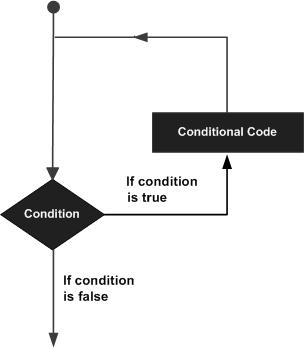There may be a situation, when you need to execute a block of code several number of times. In general, statements are executed sequentially: The first statement in a function is executed first, followed by the second, and so on.
Programming languages provide various control structures that allow for more complicated execution paths.
A loop statement allows us to execute a statement or group of statements multiple times and following is the general form of a loop statement in most of the programming languages −

Pascal programming language provides the following types of loop constructs to handle looping requirements. Click the following links to check their details.
| Sr.No | Loop Type & Description |
|---|---|
| 1 | while-do loopRepeats a statement or group of statements while a given condition is true. It tests the condition before executing the loop body. |
| 2 | for-do loopExecutes a sequence of statements multiple times and abbreviates the code that manages the loop variable. |
| 3 | repeat-until loopLike a while statement, except that it tests the condition at the end of the loop body. |
| 4 | nested loopsYou can use one or more loop inside any another while, for or repeat until loop. |
Loop Control Statements
Loop control statements change execution from its normal sequence. When execution leaves a scope, all automatic objects that were created in that scope are destroyed.
Pascal supports the following control statements. Click the following links to check their details.
| Sr.No | Control Statement & Description |
|---|---|
| 1 | break statementTerminates the loop or case statement and transfers execution to the statement immediately following the loop or case statement. |
| 2 | continue statementCauses the loop to skip the remainder of its body and immediately retest its condition prior to reiterating. |
| 3 | goto statementTransfers control to the labeled statement. Though it is not advised to use goto statement in your program. |
Leave a Reply